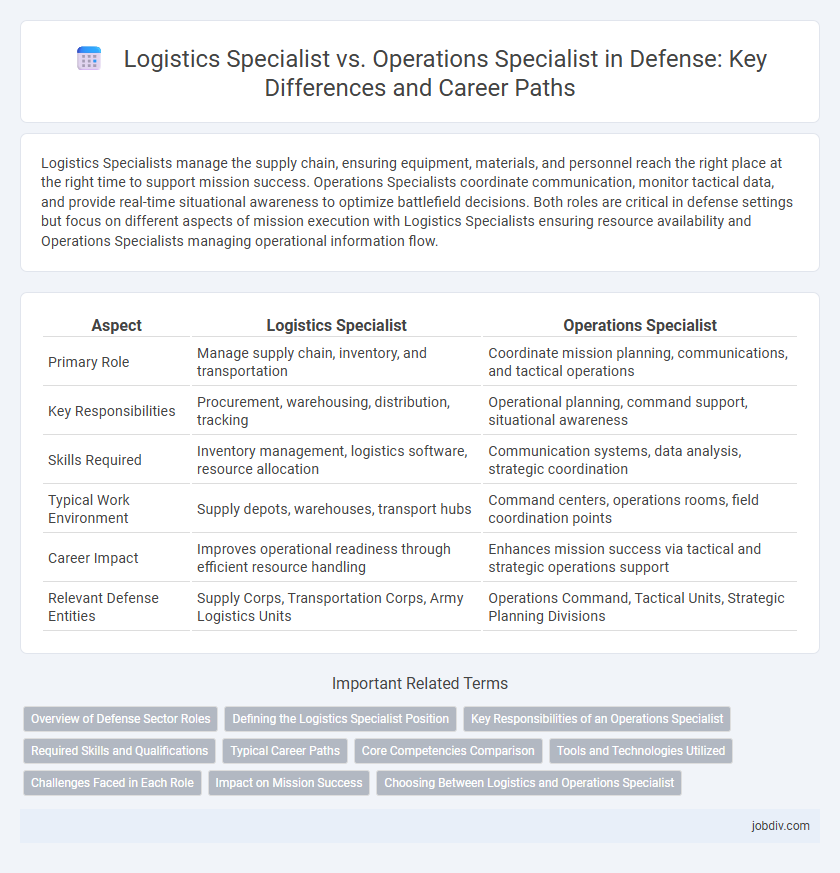Logistics Specialists manage the supply chain, ensuring equipment, materials, and personnel reach the right place at the right time to support mission success. Operations Specialists coordinate communication, monitor tactical data, and provide real-time situational awareness to optimize battlefield decisions. Both roles are critical in defense settings but focus on different aspects of mission execution with Logistics Specialists ensuring resource availability and Operations Specialists managing operational information flow.
Table of Comparison
| Aspect | Logistics Specialist | Operations Specialist |
|---|---|---|
| Primary Role | Manage supply chain, inventory, and transportation | Coordinate mission planning, communications, and tactical operations |
| Key Responsibilities | Procurement, warehousing, distribution, tracking | Operational planning, command support, situational awareness |
| Skills Required | Inventory management, logistics software, resource allocation | Communication systems, data analysis, strategic coordination |
| Typical Work Environment | Supply depots, warehouses, transport hubs | Command centers, operations rooms, field coordination points |
| Career Impact | Improves operational readiness through efficient resource handling | Enhances mission success via tactical and strategic operations support |
| Relevant Defense Entities | Supply Corps, Transportation Corps, Army Logistics Units | Operations Command, Tactical Units, Strategic Planning Divisions |
Overview of Defense Sector Roles
Logistics Specialists in the defense sector manage supply chains, inventory control, and transportation to ensure operational readiness and efficient resource allocation. Operations Specialists focus on mission planning, communication systems, and tactical coordination to support real-time decision-making and execution. Both roles are critical for maintaining defense force effectiveness, with Logistics Specialists optimizing material flow and Operations Specialists enhancing strategic operational control.
Defining the Logistics Specialist Position
The Logistics Specialist in defense is responsible for managing the supply chain, ensuring the efficient receipt, storage, and distribution of military equipment and materials. This role involves inventory control, requisition processing, and maintaining accurate logistical records to support mission readiness. Logistics Specialists coordinate transportation and supply operations, directly impacting operational efficiency and resource availability on the battlefield.
Key Responsibilities of an Operations Specialist
Operations Specialists in defense are responsible for monitoring and managing mission-critical communications, radar systems, and tactical data links to ensure situational awareness and timely decision-making. They coordinate with various units to execute operational plans, analyze intelligence data, and provide real-time updates during combat or training exercises. Their role demands expertise in signal processing, threat identification, and compliance with defense protocols to maintain operational effectiveness.
Required Skills and Qualifications
Logistics Specialists require expertise in supply chain management, inventory control, and transportation coordination, often necessitating proficiency in logistics software and physical fitness standards. Operations Specialists demand strong analytical skills, knowledge of military operations, communication abilities, and the capacity to interpret complex orders and intelligence data. Both roles typically require security clearances and completion of relevant military training programs, emphasizing attention to detail and problem-solving capabilities.
Typical Career Paths
Logistics Specialists in the defense sector typically progress through roles such as supply chain management, inventory control, and transportation coordination before advancing to logistics officer positions or supply chain analyst roles. Operations Specialists often begin with tasks related to command center coordination, tactical communications, and mission planning, moving towards positions like operations officer, intelligence analyst, or mission coordinator. Both career paths emphasize developing strategic organizational skills vital for managing resources and operational efficiency in military environments.
Core Competencies Comparison
Logistics Specialists excel in supply chain management, inventory control, and transportation coordination, ensuring timely delivery of materials to sustain military operations. Operations Specialists focus on tactical planning, mission execution, and real-time communication, orchestrating operational activities and situational awareness in combat environments. Both roles require strong problem-solving skills and attention to detail, but Logistics Specialists emphasize resource allocation while Operations Specialists concentrate on strategic mission support.
Tools and Technologies Utilized
Logistics Specialists utilize tools such as inventory management software, supply chain tracking systems, and transportation coordination platforms to ensure efficient resource distribution and asset management. Operations Specialists employ command and control systems, mission planning software, and real-time communication technologies to coordinate and execute military operations effectively. Both roles leverage advanced data analytics and secure communication tools to optimize workflow and maintain operational readiness.
Challenges Faced in Each Role
Logistics Specialists in defense face challenges such as managing complex supply chains, ensuring timely delivery of critical materials in high-pressure environments, and adapting to rapidly changing operational demands. Operations Specialists confront difficulties coordinating live communications, monitoring tactical data systems, and maintaining situational awareness during dynamic missions. Both roles demand precision, strategic problem-solving, and the ability to operate effectively under intense, evolving circumstances.
Impact on Mission Success
Logistics Specialists ensure mission success by managing supply chains, maintaining equipment readiness, and coordinating resource distribution, directly supporting operational units in the field. Operations Specialists contribute by analyzing tactical data, managing communication systems, and facilitating real-time decision-making, enhancing situational awareness and strategic planning. Both roles are critical; Logistics Specialists provide the material backbone, while Operations Specialists enable effective command and control, collectively maximizing mission effectiveness.
Choosing Between Logistics and Operations Specialist
Choosing between a Logistics Specialist and an Operations Specialist depends on mission priorities and expertise requirements; Logistics Specialists excel in supply chain management, transportation, and inventory control, ensuring materials and equipment reach the right locations efficiently. Operations Specialists focus on strategic planning, coordination of tactical missions, and communications, playing a critical role in situational awareness and command support. Understanding the distinct skill sets and responsibilities of each role enables military units to optimize resource allocation and mission success.
Logistics Specialist vs Operations Specialist Infographic

 jobdiv.com
jobdiv.com